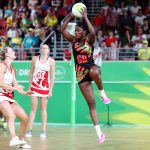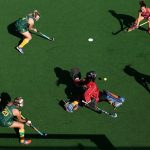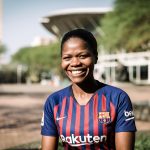Mapimpi’s natural talent for rugby
The Springbok wing didn’t think he would ever don the green and gold, coming from a remote part of the Eastern Cape. But his talent and ability to handle criticism got him to the World Cup in Japan…
Author:
18 September 2019

Of all the sports one would expect to acknowledge the gender-based violence that is currently ripping through South Africa, rugby is the unlikeliest.
Rugby has a reputation for being impervious to the workings of the country in which it thrives. Yet by the end of a week in which South African men should have hung their collective heads in shame over the way they treat women and children, rugby made an effort to recognise this fact.
To be accurate, it was Springbok wing Makazole Mapimpi who had the courage to publicly acknowledge the mayhem sweeping through the country. During the Boks’ Rugby World Cup warm-up game against Japan, he revealed to the camera the words “RIP Nene” on his wrist strapping when celebrating two of his three tries.
The tribute was to University of Cape Town student Uyinene Mrwetyana, whose rape and murder at the hands of post office worker Luyanda Botha at his workplace brought into sharp focus the inconvenient truth about the relationship South African men have with women.
That Mapimpi felt it incumbent upon him to come up with this bit of social awareness was also unexpected. The winger has only broken into the first XV this year and isn’t considered a leader in the team; his upbringing in rural Tsholomnqa (KwaMoni) in the Eastern Cape has led to some concluding that he is a country bumpkin.
The shadow of death
But of all the Springbok players, Mapimpi is probably most familiar with death. At the age of 29, he has already lost his mother, sister and brother.
His mother, Eunice, who ran a sewing business, died in a car accident while driving home from East London. Mapimpi’s sister, Zukiswa, was a nurse who succumbed to a headache that wouldn’t go away. And his brother, Zolani, lost a leg after being electrocuted while stealing electricity cables. He never recovered from his injuries and ultimately died.
These close encounters with death came with the requisite heartache. Mapimpi admits that when watching some of his teammates and opponents, he feels the pain of not having the support of his immediate family.
Related article:
“But at the end of the day, I harden up about it,” he says. “Because regardless of whether the other players have the support of their families or not, at the end of the day we’re all going to be on the same field and play together or against one another. So I push hard to do whatever I need to do on the field. Whatever happens off it, I can fend for myself.”
Silver lining
At first, Mapimpi’s hardened-up approach smacks of cold-eyed ambition in the face of death. But on closer inspection, he seems to have a firmer grasp than most on the idea that death can be a conduit to new beginnings.
“I believe that if my mother and sister were alive, I wouldn’t be here today,” he explains. “Both were opposed to me playing rugby because they felt I wouldn’t gain anything from it, so they would have insisted that I get an education or a job.
“Obviously, I’m not saying it’s a good thing they’re not here. But their absence has toughened me up to be here and left me feeling like my presence here is God’s plan.”
And he is “here”, here being the 2019 Rugby World Cup in Japan, after a journey that is all but a miracle in South African terms. When the Springboks last won the World Cup 12 years ago, Mapimpi was 17 years old. When he celebrated the victory with his friends, it was as a fan because he didn’t think he’d ever play first-class rugby, let alone international rugby.
Out of mind, out of sight
Mapimpi had begun playing the game four years earlier and was soon a sought-after player in the clustered villages of Tsholomnqa. But the problem was that the area in which he shone fell very much into the out of mind, out of sight category as far as rugby was concerned. And so the foundation of Mapimpi’s career was built on a combination of taking whatever chances came his way and providence, with destiny being another constant theme in the background.
While starring week in, week out among grown men in the aptly named (for a wing, anyway) Vultures team, Mapimpi – who started out as a flashy flyhalf with an intoxicating step and good distribution, but became a ball hog as he became bigger, only to be jettisoned to the centres – simply couldn’t see how any of his heroics would amount to a professional contract.
Related article:
“Anelisa Damba, a friend of mine who has since passed away, used to tell me that I’d make a living and money from rugby. I used to ask him: ‘How am I going to do that when I’m here with you?’ But he always insisted that I would.
“So I’ve been blessed to have people like that around me when I didn’t believe I could make it because of where I came from and how I saw myself. There’s something about others seeing something in you that you yourself don’t, in a way you end up doing it because of them.”
Frogmarched to destiny
One of the many people who frogmarched Mapimpi to his destiny was Zola Maqhashu, who facilitated his Craven Week and Border Under-19 trials. He didn’t succeed in the former but managed to get into the Border setup a year later, after stints with Mdantsane clubs Winter Rose and Swallows.
Not long after his arrival at Border, Mapimpi came under the watchful eye of Andre Human, who made it a Monday habit to pull the youngster aside for some not-so-gentle criticism of his games over the weekend.
As a result of growing up with relatives, because his mother worked away from home in East London, Mapimpi was used to the hypercriticism that becomes the reality of “outside” children, and so he’d learnt to distill criticism.
“He believed in me and he’s the one that turned me into a wing, because the Border centres at the time were really good. He’d motivate me during the game and on Mondays he’d yell at me for what I did wrong during the game.
“I was used to being yelled at and I’m also the kind of person who listens to see if there are points I can take from it.”
As it turns out, Human’s criticisms were valid, and combined with the fact that Mapimpi’s comfort zone seems to be outside of his comfort zone, the youngster’s career took off from the lessons learnt.
A whole new world
His Super Rugby stint at the Southern Kings in 2017 introduced him to the wider South African public, while his Pro 14 bow with the Cheetahs in 2017 and 2018 confirmed the sound nature of his GPS when it came to the tryline. His move to the Sharks then put him front and centre in the mind of Springbok coach Rassie Erasmus.
As South Africans, we like to pontificate over what transformation would look like if it worked.
We’ve tried the two black wings routine and the numbers game, but if a product of Jim Vabaza Senior Secondary School – a school even this Eastern Cape native had no clue existed – can elbow for room with the thoroughbreds of supposed rugby institutions like Grey College in the Springbok team, maybe there’s more to gauging transformation’s efficacy than just numbers.
When pressed on how he feels about transformation within the Springbok team, Mapimpi raves about the honesty of the coaching staff, how hard they have worked to help him with his weaknesses in defence and under the high ball.
Long story short, rugby is the only currency in the Bok team.
Related article:
If you want a story that neatly encapsulates the Makazole Mapimpi effect (incidentally, the word “Mapimpi” loosely translates in isiXhosa as a cobra), the way England World Cup winner Will Greenwood chose his World XV ahead of the World Cup would be a case in point.
Greenwood had already chosen his team when it was pointed out to him that there were no South Africans. He then supposedly replaced countryman Jonny May with Mapimpi. Knowing pundits, his response would have been something along the lines of “go with the South African left wing”, meaning World Rugby breakthrough player of the year Aphiwe Dyantyi.
But because the embattled Dyantyi has not played for the Boks this year, somebody piped up with Mapimpi, and so he ghosted his way into a World XV. The thing is, don’t be surprised if he does end up being part of the World XV on completion of the tournament.
The moral of the story is that it doesn’t matter how Mapimpi gets to where he is, he invariably ends up owning that space because his natural talent just won’t be denied.



